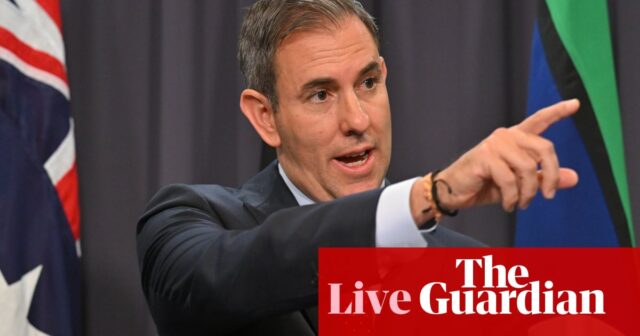‘Absolutely appropriate’ for police to investigate alleged raising of Hezbollah flags, minister says
Katy Gallagher was also asked about calls from Peter Dutton to recall the parliament and give the AFP powers to arrest people who allegedly held Hezbollah flags at protests at the weekend.
Is this something the government would consider? Gallagher said:
I think that the leader of the opposition knows that the police are and have indicated that they are investigating the matters on the weekend, including the [alleged] raising of those flags of a listed terrorist organisation.
It is appropriate, and in this country, we do have law enforcement agencies that actually undertake the investigation. The investigation is not undertaken by the leader of the opposition.
Parliament is sitting next week. I think the leader of the opposition understands what he’s doing here, which is trying to raise and create further division at a moment where people are feeling extremely concerned about what’s happening in the Middle East.
Gallagher said the alleged raising of Hezbollah flags “is absolutely inappropriate, and it is absolutely appropriate that the police investigate that matter”.
Key events

Sharlotte Thou
Indigenous women in NSW advised to have breast screenings every two years from 40
Indigenous women in NSW are advised to have breast screenings every two years from age 40 instead of 50.
The age was initially lowered from 50 as part of the Putuwa project led by the Cancer Institute NSW, as Indigenous women are diagnosed with breast cancer on average four years younger than the overall female population, and have more advanced cancer at diagnosis and poorer survival rates.
Since the project began in 2023, breast screening participation rates have more than doubled for women aged 40 to 49 (from 7.8% to 16.7%).
The project has been implemented at all NSW BreastScreen sites, where women can receive breast screenings for free without a doctor’s referral.
NSW health minister Ryan Park said:
Breast cancer is the most common cancer in Aboriginal women in NSW but the good news is that breast cancer screening can detect cancers before they can be seen or felt, and when found early, almost all breast cancers can be successfully treated. Early detection is key to saving lives and reducing the impact of breast cancer in the Aboriginal community.
RBA to consider disclosing details of private briefings after latest leak

Peter Hannam
As noted in an earlier post, treasurer Jim Chalmers has told journalists that private briefings by senior RBA staff should “be kept confidential”.
This comment was in relation to the AFR reporting this morning that RBC Capital Markets had been sin-binned for a year and won’t be receiving RBA briefings. One of those present at the February gathering apparently tipped off someone else who complained about not getting an invite (and RBC then told the RBA).
Senior RBA officials, of course, might seem like gnomes at times but they aren’t supposed to be hermits. It makes sense they “liaise” with outsiders to get feedback (apparently one former deputy governor was known to ring people up directly to avoid the palaver of formal gatherings).
Philip Lowe, the previous RBA governor, got into strife in early 2023 when he met people at a Barrenjoey event two days after the central bank hiked the cash rate.
Part of the angst was the leaking of news about the February event but he was also criticised for managing to make time for a private meeting when he hadn’t yet fronted the public, as had been customary after the summer break. (The RBA board doesn’t meet in January.)
New governor Michele Bullock, of course, now holds a media briefing after every board meeting. What to do, though, about those confidential briefings?
We understand the RBA will consider disclosing any such meetings and who attended them shortly after they take place. Let’s see how soon that change is implemented – or not.
Here’s the full story from Josh Butler, looking at those earlier comments from Tony Burke accusing Peter Dutton of seeking to “raise the temperature” of public debate about the conflict in the Middle East:
Call for human rights-based approach to protecting coral reefs
A new study suggests that a human rights-based approach to coral reef protection could ensure governments are held to account for safeguarding marine ecosystems.
Lead author Dr Emma Camp from UTS said the window of opportunity to conserve coral reefs was rapidly closing:
2024 marks the fourth global coral bleaching event impacting more than 50% of the world’s coral reefs, as well as other stressors such as pollution. This is an urgent reminder that the loss of coral ecosystems negatively impacts both humans and nonhumans.
Implementing coral reef conservation through a human rights-based approach will provide a practical path towards a much-needed transformation of local, national, and international governance, while also highlighting the human side of coral loss.
In 2022 the human right to a clean, healthy and sustainable environment was affirmed by the UN general assembly.
Co-author Dr Genevieve Wilkinson said a rights-based approach to this issue “embeds non-discrimination, empowerment and participation so that litigation is not the only available avenue for participation and empowerment of vulnerable rightsholders”:
States must be accountable to obligations to protect human rights and find just solutions.
Children’s commissioner to address National Press Club tomorrow
The children’s commissioner, Anne Hollonds, is due to address the National Press Club tomorrow on a new report calling for an overhaul of Australia’s approach to child justice.
The report has been developed over 12 months and contains 24 recommendations, focusing on elevating child wellbeing to a national priority, coordinating action on child justice reform across Australia’s federation, and ensuring reform is based on evidence and human rights.
There were hundreds of submissions, interviews and consultations, including with more than 150 children and young people who have been or are at risk of being in contact with police and criminal justice systems, or in youth detention.
Hollonds will tomorrow detail the findings of the report, unpack key recommendations and address the barriers to action – including the role of the media and how “politics gets in the way of prevention”.
Kyle and Jackie O’s Melbourne expansion flops in the ratings

Amanda Meade
Kyle and Jackie O have risen to the top spot in Sydney radio but the pair’s expansion into Melbourne radio has flopped, according to the latest radio ratings covering July to September.
Ratings agency GfK has reported that their KIIS FM breakfast show is down from 6.1% to 5.2% in the Melbourne market, which appears not to have embraced their vulgar style of broadcasting.
The top radio station in Melbourne is Nine’s 3AW with a share of 14.9%.
The leading breakfast show, 3AW’s Russel and Ross, has a 22.5% share.
But the duo has taken over from 2GB’s Ben Fordham in Sydney as the leading breakfast show, despite losing 0.6% of their audience this survey.
In good news for ABC local radio, breakfast presenter Craig Reucassel has grown his share by 1.2% while Fordham has lost 3.1 share points.
The most popular radio station in Adelaide is Mix 102.3.
Grave warning for Australians as Israel invades Lebanon
AAP has more details about Australia’s work to get its citizens out of Lebanon as Israel launches a ground invasion.
Those in Lebanon are being assisted by Dfat to secure commercial airline tickets as the risk of the international airport shutting heightens.
It follows months of repeated warnings to Australians in Lebanon that they needed to leave as the security situation deteriorated and any repatriation effort in a crisis would be severely strained and unable to evacuate everyone.
Foreign affairs minister Penny Wong has reiterated calls for Australians to take the first opportunity to leave:
There is a risk Beirut airport may close for an extended period … We continue to urge Australians in Lebanon to take the first opportunity they can to depart. Please do not wait for a preferred route.
Canada has secured 800 seats on commercial flights across three days to evacuate its citizens, permanent residents and their immediate families.
Treasurer Jim Chalmers urged restraint, saying Australia was “gravely concerned for the human cost of an escalation of this conflict”. You can read more of his comments earlier in the blog here.
Queensland needs a fresh start, Crisafulli says
The Queensland opposition leader, David Crisafulli, spoke to ABC News Breakfast this morning from Cairns, as the Miles’ Labor government goes into caretaker mode before the 26 October election.
He was asked about his use of the term “underdog” for himself, given the promising numbers in the polls. Crisafulli responded:
Since 1986, the last 12 elections, the LNP have won one. So you can forgive me for not buying any of that hype at all …
Ultimately, the battle lines for this election is – after 10 years of this government, are things better or worse when it comes to youth crime, health, housing, cost of living? And who’s got the right plans to do something about it? And that’s our focus. And the state does need a fresh start.
Crisafulli also spoke about his stance on youth crime:
I am proposing a 12-month plan – six months intensive – where young kids are given the structure to turn their life around … Yes, there will be people who disagree with one part of that plan. I respect that.
But what’s happening in Queensland at the moment is broken, and we intend to make sure that, at every single level of the youth crime crisis, we deal with it and do something about it – and change does need to occur.

Peter Hannam
Manufacturing gauge sinks to record lows outside the height of Covid
The Reserve Bank has made it clear that it’s mostly worried about bringing inflation to heel before it starts cutting interest rates. Data out today, though, might provide a couple of other data points for it to ponder.
First up, Judo Bank has released its monthly manufacturing purchasing manager’s index, with all the arrows pointing lower. New orders and production are sinking at the fastest pace since May 2020 and export orders are declining “solidly” (that’s a new descriptor).
The price factories are asking for their widgets (etc) are increasing but at a slower rate in line with input costs. The index also noted firms were cutting staff and workloads.
All up, the index is down for an eight month in a row, with the slide in September the steepest since May 2000 when Covid disruptions were near their worst.
Separately, the weekly ANZ–Roy Morgan Australian Consumer Confidence survey also retreated a bit, with households’ confidence about financial conditions wilting at the fastest pace in more than a year, ANZ said.
More to the RBA’s liking, though, was a notable slide of 0.3 percentage points in inflation expectations to 4.6%. That’s a level last reached in September 2021.
Later this morning ABS will release August data on retail sales and building approvals, so the RBA – and the rest of us – can learn a bit more about how the economy is faring.
More than 80% of people in Lebanon are living in poverty, Caritas Australia chief says
The interim CEO of aid agency Caritas Australia, Kirsten Sayers, says more than 80% of people in Lebanon are now living in poverty. This comes amid news Israel has launched what it is calling a “limited” ground invasion.
Economically, Sayers said, the situation was already dire in Lebanon before this conflict, with “with the cost of purchasing essentials having skyrocketed by percentages in the hundreds” after the explosion in the Port of Beirut.
She said the increase in costs has been “incomprehensible” – comparing it to Australians spending $160 a week on average for food, and having this increased to $560 in just one year:
Most previously self-sufficient families are now facing a similar level of need to the nation’s sizeable refugee population and this conflict, bringing damage to resources and infrastructure, will only make things worse.
She said the conflict could result in “the destruction of critical infrastructure such as roads, and potentially make it hard for commercial companies and even aid organisations to get goods across borders”.










